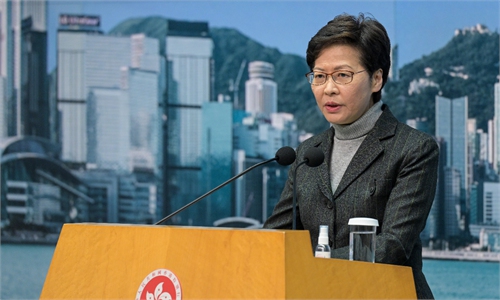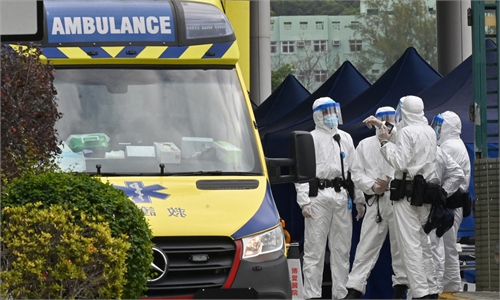HK postpones Chief Executive Election amid epidemic, strives to meet mass testing, quarantine demands with mainland aid
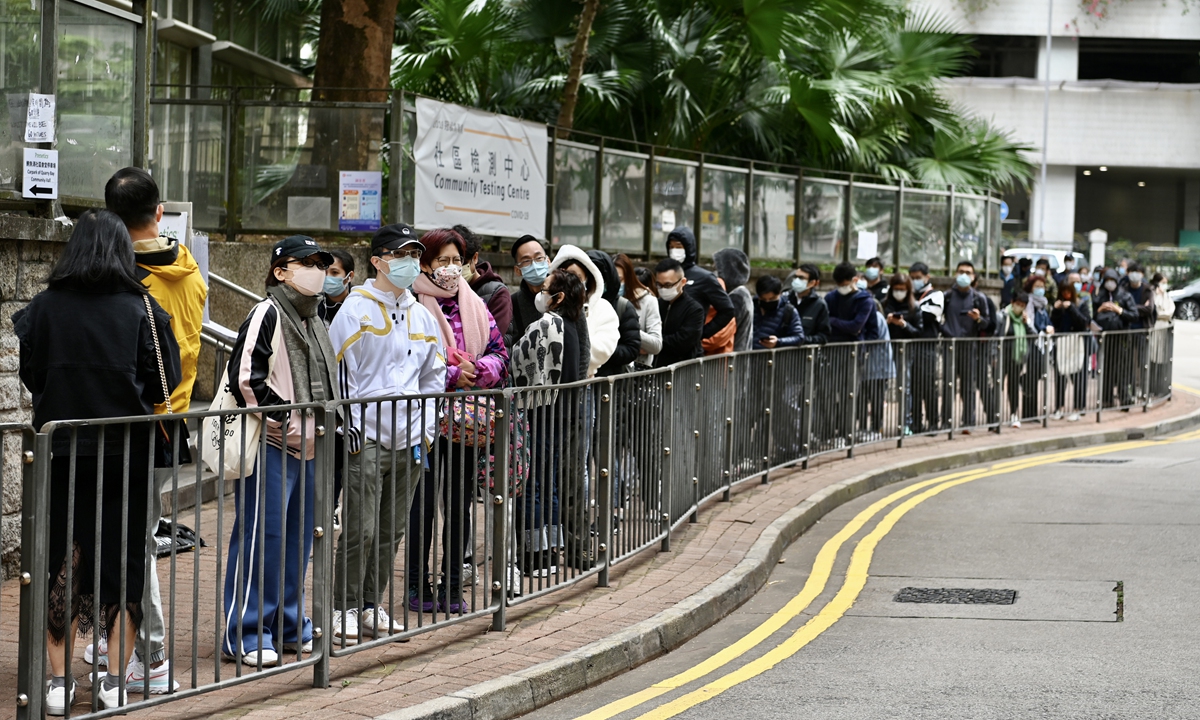
Hong Kong residents line up to take nucleic acid tests as the city battles an outbreak of the COVID-19 Omicron variant. Hong Kong confirmed 986 infections and registered another 800 primary positive cases on February 10, 2022. Photo: cnsphoto
While the city is mulling sweeping nucleic acid testing to curb fast infections, the mainland has made efforts to support it to increase daily testing capability, and experts also called for accelerating dealing with confirmed cases with more measures, especially by building shelter hospitals.
According to data from Hong Kong's health authority, previously the city had reported 37,071 infections. Influenced by the Omicron variant, Hong Kong has witnessed a surge in infections in the past days.
Carrie Lam, chief executive of the HKSAR government, announced at a press conference on Friday the decision to postpone the Chief Executive Election, which was originally scheduled for March 27 to May 8. And the city has been preparing for full-scale nucleic acid testing.
This round of epidemic in Hong Kong is very severe and the daily increases in the past two days surpassed the accumulated numbers in the past two years. Severe cases and deaths may increase in the coming days given the low vaccination rate among senior citizens in Hong Kong and tight medical resources, Zhuang Shilihe, a Guangzhou-based immunologist, told the Global Times on Friday.
Mass testing could help Hong Kong detect patients at an early stage, which is important for Hong Kong to stick to the dynamic zero COVID-19 policy, but Hong Kong has to first prepare enough quarantine and treatment facilities for a possible increase in patients found from mass testing. Otherwise, mass testing will not work, Leung Chi-chiu, a respiratory disease expert and former chairman of the Hong Kong Medical Association's advisory committee on communicable diseases, told the Global Times on Friday.
He stressed that Hong Kong needs to take action immediately, stick to the dynamic zero policy, and not choose to live with the virus.
He predicted that if Hong Kong chose to live with the virus, the daily cases would surge to 25,000 and it would take about 90 days before the city's cases turn to a downward trend. And Hong Kong's medical system would have no way to deal with the huge number of patients, especially given that many of them would be the elderly with serious conditions.
Margaret Chan Fung Fu-chun, honorary director-general of the World Health Organization (WHO), told the Global Times that instead of "living with the virus," only by upholding dynamic zero policy in fighting the coronavirus and reopening the channels with the mainland can Hong Kong get rid of the epidemic. This is the only way to help the city merge into the country's overall development and is also the patriotic choice.
The Hong Kong government has established many new testing stations in various districts, with the establishment of "Huo-Yan lab" in the Ma On Shan Sports Centre. The city's daily testing capability is expected to increase to 300,000, Hong Kong media reported.
However, one challenge for mass testing is that Hong Kong has insufficient medical staff to perform the testing and also lack service staff to maintain order so as to prevent cross-transmissions during the testing, Leung said.
If residents in the city of 7.5 million have at-home rapid antigen testing first, it's possible that people who need to take part in the mass testing can be reduced to less than 200,000 a day.
Leung further explained that considering the accuracy of the rapid tests is around 98 percent, the results for 150,000 people would be false positives. It means that the city would only need to test 180,000 residents daily even if Hong Kong's daily cases surged to 30,000, Leung said.
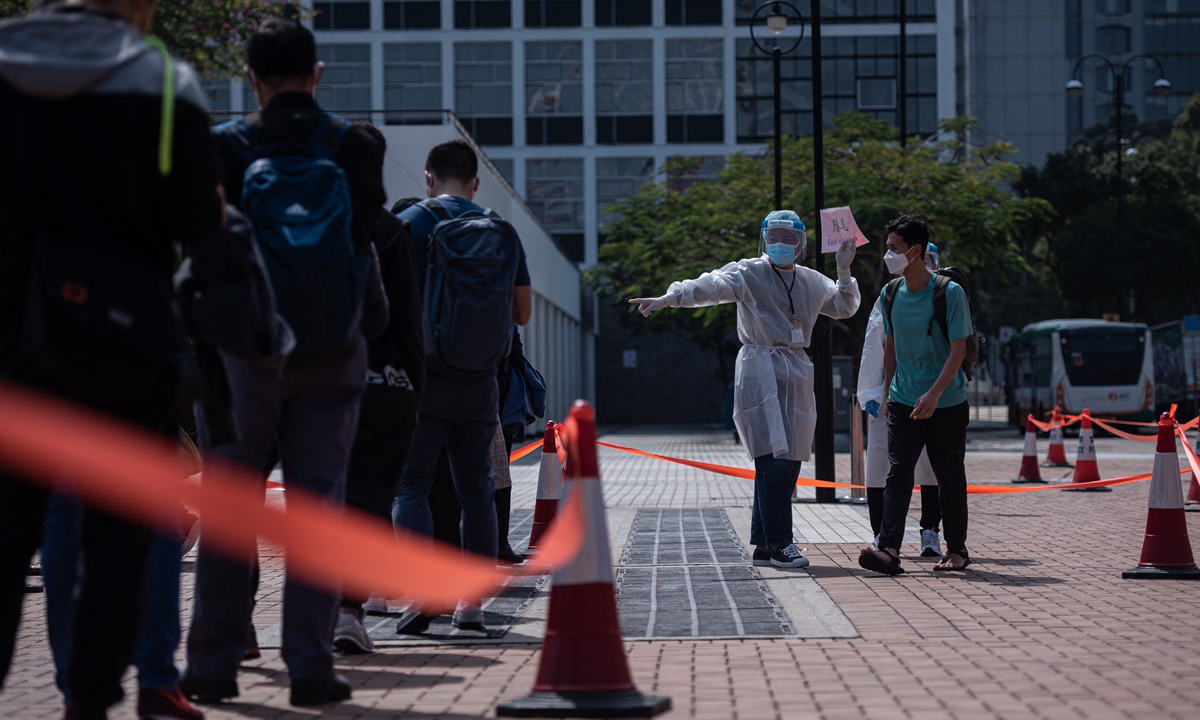
People line up for COVID-19 testing in Hong Kong on February 12, 2022, as city authorities scrambled to ramp up testing capacity following a record high of new infections. Photo: AFP
Jin Dongyan, a biomedical professor at the University of Hong Kong, agrees with Leung that Hong Kong has to take immediate action to put confirmed infections under quarantine to cut transmissions, as the dominating variant in Hong Kong is the highly transmissible BA.2 variant of Omicron.
Jin also encouraged the residents, especially the elderly who appear to be at high risk of serious disease and death in this round of outbreak in Hong Kong, to get vaccinated as soon as possible.
According to the Hong Kong regional authority, about 84 percent have accepted at least one shot of the vaccine and 75.1 percent have accepted at least two shots as of Thursday. About 1.4 million people have accepted a third shot as of the same day.
The Chinese mainland sent its first batch of experts to Hong Kong on Thursday one day after instructions from President Xi Jinping were reported to aid Hong Kong in the fight against the surging COVID-19 epidemic. On Friday, the four-member team visited the Huo-Yan nucleic acid test laboratory and met with officials in Hong Kong.
In addition to the expert team, Guangdong Province also sent nucleic acid testing vehicles to Hong Kong on Thursday, which many experts said would help the city increase its testing capability.
Test kit suppliers from the mainland and the operator of the Huo-Yan nucleic acid test laboratory also responded swiftly.
Guangzhou-based coronavirus test kit maker Wondfo Biotech said in a statement sent to the Global Times on Friday that as a company that has repeatedly aided global efforts to fight the pandemic, the company will use "every resort" and pledge "full support" to aid Hong Kong.
One of the Huo-Yan nucleic acid test laboratories arrived in Hong Kong on Thursday, Chinese genomics firm BGI Group confirmed with the Global Times on Friday.
The first lab, which consists of 16 air-inflated film chambers and is equipped with around 100 testing facilities, was put into operation on Tuesday, immediately boosting Hong Kong's sample testing capacity by 100,000 tubes a day while a reagent testing method will further multiply that capacity, BGI said.
Jiangsu Bioperfectus Technologies, a large test kit supplier, and Sansure Biotech, another one based in Central China's Hunan Province, told the Global Times on Friday they are making efforts to aid Hong Kong's testing capability.
Swift actions
Aside from sweeping nucleic acid tests, experts are calling for the building of shelter hospitals to deal with confirmed cases.
The most urgent task for Hong Kong is to accelerate the coming out of the ongoing test results and building makeshift hospitals, Tam Yiu-chung, a member of China's National People's Congress Standing Committee from Hong Kong, told the Global Times on Friday.
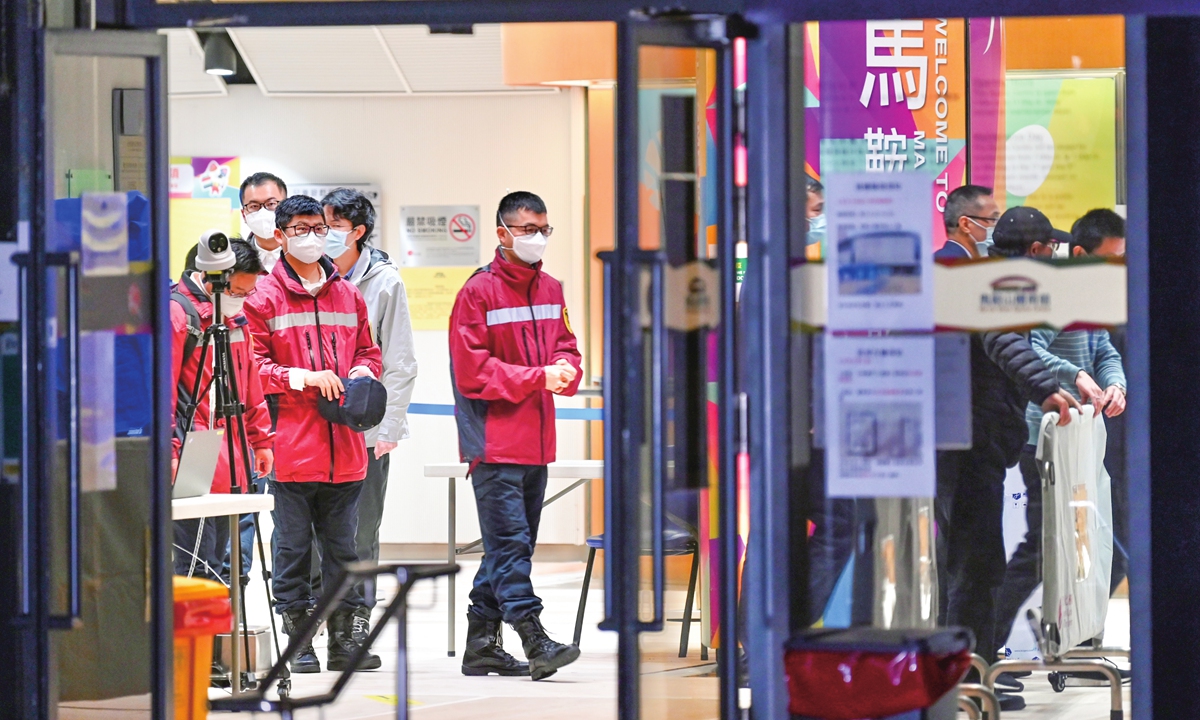
Epidemiologists from the Chinese mainland arrive at Hong Kong's Fire Eye Laboratory to learn about the epidemic situation on February 17, 2022. The first group of mainland epidemiologists and vehicles for nucleic acid testing arrived in Hong Kong to assist the city to tame the severe COVID-19 outbreak. Photo: cnsphoto
Tam said it's slow, as people have to wait for days for the results of the tests. Hopefully, the mainland expert team could help deal with the issue. All confirmed cases have to be put under quarantine as soon as possible, so building more facilities like Fangcang makeshift hospitals is necessary, Tam said.
Local authorities are preparing to convert the Asia World-Expo into a Fangcang makeshift hospital and more places are needed, the senior official said, noting that the Hong Kong Convention and Exhibition Centre could also be used as a quarantine place.
Leung also noted that it's important for Hong Kong to convert some communities, hotels, dormitories and even cruise ships into temporary quarantine facilities. He also said seniors living in elderly care homes should be transferred to private hospitals so theses care homes could be turned into treatment facilities for confirmed patients.
Addressing the shortage in medical workers, Leung said Hong Kong needs to mobilize young people who are vaccinated to help provide service at quarantine facilities.
Lam also noted that the government is finding venues to isolate confirmed cases, including hotels and apartments, and seeking assistance from the central government in building shelter hospitals.
